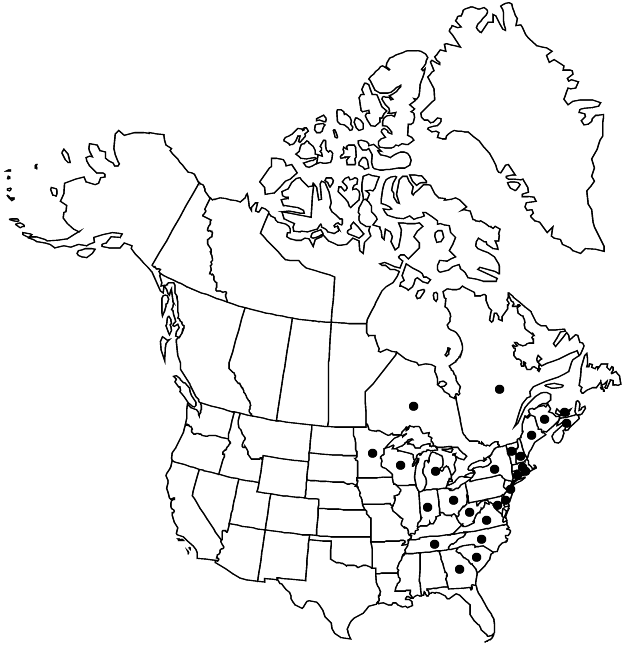Difference between revisions of "Chrysosplenium americanum"
Fl. Bor.-Amer. 1: 242. 1832 ,.
FNA>Volume Importer |
imported>Volume Importer |
||
| (5 intermediate revisions by 2 users not shown) | |||
| Line 7: | Line 7: | ||
}} | }} | ||
|common_names=American golden-saxifrage;water-mat or;carpet;dorine d’Amérique | |common_names=American golden-saxifrage;water-mat or;carpet;dorine d’Amérique | ||
| + | |special_status={{Treatment/ID/Special_status | ||
| + | |code=E | ||
| + | |label=Endemic | ||
| + | }} | ||
|basionyms= | |basionyms= | ||
|synonyms= | |synonyms= | ||
| Line 31: | Line 35: | ||
-->{{#Taxon: | -->{{#Taxon: | ||
name=Chrysosplenium americanum | name=Chrysosplenium americanum | ||
| − | |||
|authority=Schweinitz ex Hooker | |authority=Schweinitz ex Hooker | ||
|rank=species | |rank=species | ||
| Line 45: | Line 48: | ||
|publication title=Fl. Bor.-Amer. | |publication title=Fl. Bor.-Amer. | ||
|publication year= | |publication year= | ||
| − | |special status= | + | |special status=Endemic |
| − | |source xml=https:// | + | |source xml=https://bitbucket.org/aafc-mbb/fna-data-curation/src/2e0870ddd59836b60bcf96646a41e87ea5a5943a/coarse_grained_fna_xml/V8/V8_140.xml |
|genus=Chrysosplenium | |genus=Chrysosplenium | ||
|species=Chrysosplenium americanum | |species=Chrysosplenium americanum | ||
Latest revision as of 22:41, 5 November 2020
Stolons white or tan, 0.3–1 mm diam., glabrous. Flowering stems repent, decumbent, or ascending, branching in distal 1/4–1/2, 4–30 cm, glabrous. Leaves opposite, sometimes alternate distally, membranous. Stolon leaves: petiole 1–4 mm, glabrous; blade ovate to depressed-ovate, round, or flabellate, 2.5–15 × 2–10(–20) mm, base attenuate to cordate, margins subentire or 5–7(–9)-crenate or -crenulate, not purple-spotted, glabrous, surfaces glabrous abaxially and adaxially. Cauline leaves 4–9; petiole absent or 0.1–4 mm, glabrous; blade ovate to depressed-ovate, round, or flabellate, 2.5–15 × 2–10(–20) mm, base attenuate to cordate, margins 5–7(–9)-crenate or -crenulate, glabrous, surfaces glabrous abaxially and adaxially. Inflorescences terminal or axillary solitary flowers or 2–10-flowered, open cymes; bracts green, not purple-spotted, foliaceous, ovate to flabellate, 2–7 × 2–7 mm, margins subentire or 5–7-crenate or -crenulate. Pedicels absent or 0.1–0.8 mm. Flowers: hypanthium green, not purple-spotted, turbinate, 0.9–1.8 × 1.4–2.6 mm, glabrous; sepals spreading to erect, green, greenish yellow, or greenish red, not purple-spotted or purplish brown-spotted distally, broadly triangular or broadly ovate to nearly round, 1.3–1.8 × 0.9–1.6 mm, apex obtuse to rounded; nectary disc conspicuous, green or purple, 8-lobed; stamens 4–8, 0.5–0.9 mm; anthers purple, red, or orange, 0.2–0.3 × 0.4–0.5 mm; styles 0.2–0.6 mm. Seeds 6–16, dark brown, spheroid to ovoid, (0.5–)0.6–0.8 mm, puberulent. 2n = 18, 24.
Phenology: Flowering Mar–Jul.
Habitat: Marshy ground, streamsides, seeps, springs, swampy woods
Elevation: 0-1500 m
Distribution

N.B., N.S., Ont., P.E.I., Que., Conn., Del., Ga., Ind., Maine, Md., Mass., Mich., Minn., N.H., N.J., N.Y., N.C., Ohio, R.I., S.C., Tenn., Vt., Va., W.Va., Wis.
Discussion
Selected References
None.